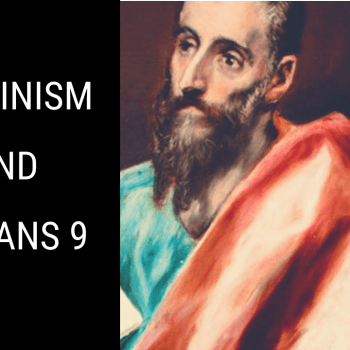The book of Hebrews has been posed the most difficulty when dealing with the “L” and “P” in TULIP. The several warning passages, in Hebrews 6 and other places, have seemed to indicate that a true Christian can fall away. When examining the book of Hebrews, I have found that these passages, read in context, do teach that a believer can fall away. I also believe that they teach that Christ is the propitiation and mediator for all men without distinction. I will explain why I think Hebrews teaches both of these points.
First, view all of the falling away passages within the book:
“Therefore we must pay much closer attention to what we have heard, lest we drift away from it. For since the message declared by angels proved to be reliable, and every transgression or disobedience received a just retribution, how shall we escape if we neglect such a great salvation?” (Hebrews 2:1-3)
“Take care, brothers, lest there be in any of you an evil, unbelieving heart, leading you to fall away from the living God. But exhort one another every day, as long as it is called “today,” that none of you may be hardened by the deceitfulness of sin. For we have come to share in Christ, if indeed we hold our original confidence firm to the end.” (Hebrews 3:12-14)
“Therefore, while the promise of entering his rest still stands, let us fear lest any of you should seem to have failed to reach it.” (Hebrews 4:1)
“Let us therefore strive to enter that rest, so that no one may fall by the same sort of disobedience.” (Hebrews 4:11)
“For it is impossible, in the case of those who have once been enlightened, who have tasted the heavenly gift, and have shared in the Holy Spirit, and have tasted the goodness of the word of God and the powers of the age to come, and then have fallen away, to restore them again to repentance, since they are crucifying once again the Son of God to their own harm and holding him up to contempt. For land that has drunk the rain that often falls on it, and produces a crop useful to those for whose sake it is cultivated, receives a blessing from God. But if it bears thorns and thistles, it is worthless and near to being cursed, and its end is to be burned.” (Hebrews 6:4-8)
“Let us hold fast the confession of our hope without wavering, for he who promised is faithful. And let us consider how to stir up one another to love and good works, not neglecting to meet together, as is the habit of some, but encouraging one another, and all the more as you see the Day drawing near.
For if we go on sinning deliberately after receiving the knowledge of the truth, there no longer remains a sacrifice for sins, but a fearful expectation of judgment, and a fury of fire that will consume the adversaries. Anyone who has set aside the law of Moses dies without mercy on the evidence of two or three witnesses. How much worse punishment, do you think, will be deserved by the one who has spurned the Son of God, and has profaned the blood of the covenant by which he was sanctified, and has outraged the Spirit of grace? For we know him who said, “Vengeance is mine; I will repay.” And again, “The Lord will judge his people.” It is a fearful thing to fall into the hands of the living God.” (Hebrews 10:23-31)
“See to it that no one fails to obtain the grace of God; that no “root of bitterness” springs up and causes trouble, and by it many become defiled; that no one is sexually immoral or unholy like Esau, who sold his birthright for a single meal. For you know that afterward, when he desired to inherit the blessing, he was rejected, for he found no chance to repent, though he sought it with tears.” (Hebrews 12:16-17)
These passages are scattered through out the book. In fact, the book is structured around this concept. The author is warning these believers not to fall away. These are most likely Jews considering reverting to Judaism to escape persecution. To counter this, the author seeks to explain, in detail, how the New Covenant is superior to the old. How the reformed have typically dealt with these passages is to say that those who “fall away” are not truly believers. They are external members of the church. They were never regenerated, justified, saved, and Christ never died for these people.
However, to say that Christ was never the advocate for those who fall away is to destroy the argument of the book. He is urging them to remain within the faith precisely because Christ is their mediator. The argument essentially is “Christ is a better sacrifice than those of the old covenant; He is a better priest than those of the old covenant.” The premise of the argument assumes that Christ is their mediator. How can they relapse into a worse mediator/priest/sacrifice if they never had a better one in the first place? It makes no sense.
Observe the following passages:
“Since then we have a great high priest who has passed through the heavens, Jesus, the Son of God, let us hold fast our confession. For we do not have a high priest who is unable to sympathize with our weaknesses, but one who in every respect has been tempted as we are, yet without sin. Let us then with confidence draw near to the throne of grace, that we may receive mercy and find grace to help in time of need.” (Hebrews 4:14-16)
The author is assuming, without qualification, that Christ is the high priest of himself and all of his readers. He argues that because Christ is our high priest, let us not fall away from Him.
“We have this as a sure and steadfast anchor of the soul, a hope that enters into the inner place behind the curtain, where Jesus has gone as a forerunner on our behalf, having become a high priest forever after the order of Melchizedek.” (Hebrews 6:19-20)
“For it was indeed fitting that we should have such a high priest, holy, innocent, unstained, separated from sinners, and exalted above the heavens.” (Hebrews 7:26)
“Now the point in what we are saying is this: we











